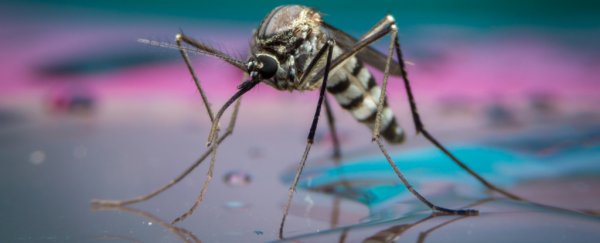If you're one of the unlucky ones - like myself - who gets assaulted by mosquitoes while your best friend beside you sits untouched, you can thank your genes, new research suggests.
A study conducted in the UK has tested how likely a certain type of mosquito, Aedes aegypti, was to attack a few dozen pairs of courageous twins.
While identical twins were observed to be equally attractive to the mosquitoes, the correlation wasn't as great in fraternal - or non-identical - twins, indicating to the researchers that mosquitoes might be making preferential choices based on differences in our DNA.
The results, published in the journal PLOS One, could help researchers develop new ways to keep mosquitoes at bay. Not only would this prevent unwanted itchiness after a flurry of bites in the backyard, but it could also help to limit the transmission of dangerous mosquito-borne diseases like malaria, dengue fever and West Nile virus. These illnesses are collectively estimated to account for about 1 million deaths annually.
"If we understand the genetic basis for variation between individuals it could be possible to develop bespoke ways to control mosquitoes better, and develop new ways to repel them," lead author and medical entomologist, James Logan, from the London School of Hygiene and Tropical Medicine in the UK, told Smitha Mundasad from the BBC.
You may have been told that mosquitoes are attracted to you because you have "sweet blood". As nice as that sounds, it's all a ruse. Female mosquitoes - the ones that bite, in order to get protein necessary for egg development - are actually drawn to us by chemical signals related to body odour.
We've long known they have a preference for some people over others. For instance, in parts of Africa, pregnant women have been shown to be more likely targets than non-pregnant women. Logan and his team wanted to test whether genes that control body odour might be the reason why.
To do this, he enlisted 18 pairs of identical twins, who share almost identical DNA, and 19 pairs of fraternal twins, who are considered to be only as genetically similar as most siblings. In a series of experiments, each twin in the pair was made to put their arm inside a clear plexiglass tube, which was part of a Y-shaped wind tunnel.
Air was blown past their hands, carrying odours through the Y-shaped structure to mosquitoes clustered at the far end of the long tube. The mosquitoes were then released and researchers watched how they responded.
As Rob Stein explains for NPR, "the insects could choose between the twins - to fly upwind, along either side of the Y, presumably following the odour of the person they were most attracted to. The scientists used a new batch of hungry mosquitoes in each trial, and also compared the results to trials that involved 'clean air' and nobody's hand."
In the experiments involving identical twins, researchers reported that there was little difference in the distribution of mosquitoes, while for fraternal twins, there was a greater variation in distribution and preference.
Logan told Biana Nogrady at ABC Science that previous studies suggest that people who don't attract mosquitoes produce extra chemicals in their skin, which may help fend them off.
"It's almost like the body has a natural defence system against mosquitoes and it seems to be genetically controlled," he said.
David Weetman, from the Liverpool School of Tropical Medicine, told the BBC it was a "novel and intriguing finding" and the "first time a genetic basis has been demonstrated".
But he also said larger studies will need to be carried out to "assess how relevant these findings are outside the laboratory where other factors may be important."
Despite the relatively small sample size, the idea of a pill that might be able to induce mosquito repellant body odour is exciting, especially given the toll of mosquito-borne diseases.
Sources: BBC, NPR, ABC Science
